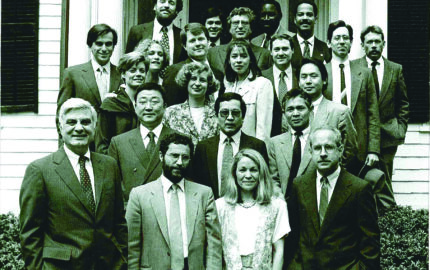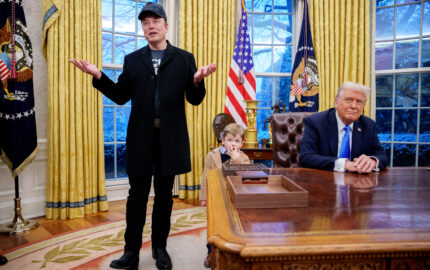As the Nieman Foundation’s Advisory Board met in early November on the eve of the convocation celebrating 70 years of Nieman Fellowships, two questions dominated the discussions:
The press is less institutional than it was when the first Nieman Fellows came to Harvard in the fall of 1938. While most fellows still come from mainstream news organizations, especially newspapers, an increasing number of fellows arrive as freelancers, and many of them blog. Even those from established newsrooms bring with them a sense that their careers will head them in new directions.
The central design of a year of study in Harvard classrooms has remained steady through the years. Each fellow shapes a program designed to serve a specific need: filling gaps in education, exploring new fields of learning, preparing for a different assignment at year’s end. Nieman Fellows have always been in transition in thinking deeply about what they want to do as journalists. For years, this meant enriching their minds as preparation for their return to their newspaper or broadcast news organization. Today, Nieman Fellows explore unfamiliar paths and use the knowledge and skills gained along the way as the keys to unlocking fresh opportunity.
These days fellows face buyout offers or circumstances that force them to consider taking alternative paths in journalism. This unsettling reality brings new meaning to the program’s transformative nature, and we are addressing this challenge by supplementing the core program with seminars and workshops that acquaint fellows with the new tools necessary for storytelling in the digital age.
Fellows also benefit from Nieman initiatives serving audiences beyond Harvard.
The advisory board members reflected on these developments and talked about other fellowship programs that are introducing significant changes. At the John S. Knight Fellowships at Stanford, for example, applicants now propose a project—to be worked on during their fellowship year—that addresses a journalistic challenge with an emphasis on innovation and entrepreneurship resulting in a business proposal, a progress report, or a public conference.
Our discussions about the continuing role of the Nieman Fellowship program took place under the shadow of volatility in the financial markets and uncertainty that persists as a new economic reality. Some advisory board members wondered whether the changes in journalism and the downsizing of mainstream news organizations would influence the composition of future Nieman classes. Will the number of applicants increase or shrink? Would journalists be attracted to the program at earlier points in their careers as they look to buttress their journalistic values and acquire knowledge to influence their work in the years ahead?
Board members encouraged the Nieman Foundation to stay the course and preserve the original purpose of a year for fellows to learn and reflect, whether they are in transit or anticipate a return to their newsrooms.
Here at Harvard, President Drew Faust has told the university community that even though universities have for centuries shown remarkable resilience and creative power in the face of unpredictability and change, the present downturn will have an impact on even well diversified portfolios such as Harvard’s. What the impact will be is influenced by the university’s prudent policies over the years in distributing endowment payouts.
Harvard’s management practices are designed to weather this kind of downturn and enable endowed units, such as the Nieman Foundation, to avoid making sharp cuts in its educational programs. In this time of uncertainty, the foundation is weighing options and discussing strategic steps that will enable us to continue a strong fellowship program for the class of 2010 and beyond.
- Should the foundation reconsider its mission of midcareer education in response to the dramatic and disruptive technological and economic changes affecting journalism?
- How can the foundation give the fellows a more transformational experience to help them think through and prepare for their roles in the new world of journalism?
The press is less institutional than it was when the first Nieman Fellows came to Harvard in the fall of 1938. While most fellows still come from mainstream news organizations, especially newspapers, an increasing number of fellows arrive as freelancers, and many of them blog. Even those from established newsrooms bring with them a sense that their careers will head them in new directions.
The central design of a year of study in Harvard classrooms has remained steady through the years. Each fellow shapes a program designed to serve a specific need: filling gaps in education, exploring new fields of learning, preparing for a different assignment at year’s end. Nieman Fellows have always been in transition in thinking deeply about what they want to do as journalists. For years, this meant enriching their minds as preparation for their return to their newspaper or broadcast news organization. Today, Nieman Fellows explore unfamiliar paths and use the knowledge and skills gained along the way as the keys to unlocking fresh opportunity.
These days fellows face buyout offers or circumstances that force them to consider taking alternative paths in journalism. This unsettling reality brings new meaning to the program’s transformative nature, and we are addressing this challenge by supplementing the core program with seminars and workshops that acquaint fellows with the new tools necessary for storytelling in the digital age.
Fellows also benefit from Nieman initiatives serving audiences beyond Harvard.
- The Nieman Journalism Lab is finding a place in ongoing discussions about journalism in a digital world and the search for economic models that can sustain quality journalism. The lab, through its Web site, www.niemanlab.org, is providing daily posts about issues of the journalistic craft and business models.
- Nieman Reports is enlarging its capacity in the digital arena, aided by the foundation’s redesigned Web site. With its own URL, www.niemanreports.org, offering readers a separate link to each story, its online audience will be able to share articles with friends, leave comments, and publish links to stories related to various topics.
- By year’s end, we plan to launch on our Web site, www.nieman.harvard.edu, an online community for alumni that will create a place for fellows to interact and share ideas about the program with the foundation staff.
The advisory board members reflected on these developments and talked about other fellowship programs that are introducing significant changes. At the John S. Knight Fellowships at Stanford, for example, applicants now propose a project—to be worked on during their fellowship year—that addresses a journalistic challenge with an emphasis on innovation and entrepreneurship resulting in a business proposal, a progress report, or a public conference.
Our discussions about the continuing role of the Nieman Fellowship program took place under the shadow of volatility in the financial markets and uncertainty that persists as a new economic reality. Some advisory board members wondered whether the changes in journalism and the downsizing of mainstream news organizations would influence the composition of future Nieman classes. Will the number of applicants increase or shrink? Would journalists be attracted to the program at earlier points in their careers as they look to buttress their journalistic values and acquire knowledge to influence their work in the years ahead?
Board members encouraged the Nieman Foundation to stay the course and preserve the original purpose of a year for fellows to learn and reflect, whether they are in transit or anticipate a return to their newsrooms.
Here at Harvard, President Drew Faust has told the university community that even though universities have for centuries shown remarkable resilience and creative power in the face of unpredictability and change, the present downturn will have an impact on even well diversified portfolios such as Harvard’s. What the impact will be is influenced by the university’s prudent policies over the years in distributing endowment payouts.
Harvard’s management practices are designed to weather this kind of downturn and enable endowed units, such as the Nieman Foundation, to avoid making sharp cuts in its educational programs. In this time of uncertainty, the foundation is weighing options and discussing strategic steps that will enable us to continue a strong fellowship program for the class of 2010 and beyond.



